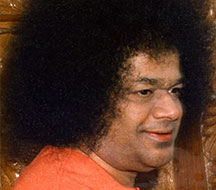
Life teachings of Mahavira
Puttaparthi, Prasanthi Nilayam (Dasara )
Description
Mahavira who propounded the religion of Jainism upheld the principles of devotion and dedication and taught that doing one’s duty is the foremost goal of one’s life. He preached that one should recognise that the entire world is God’s creation and hence one should abstain from misusing or harming any being. He established the truth that God is present in all beings.
Topics
-Saints
-
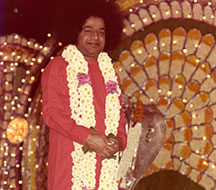
Buddha's life teachings
00:02:12Thereafter the religion of Buddha or Buddhism came into existence. Buddha was the son of Mayadevi and Sudhdhodana. He propagated that man must make worthy use of the physical and mental capacities and know the truth through enquiry and know the root cause for the sorrows of the world and ultimately go beyond them with the help of the truth. Buddha preached that the pain and sorrow are all creations and illusions of one’s thoughts and that the pain and sorrow could be eliminated with the understanding of the inner meaning of life. ‘Dharmam sharanam gachchaami, Buddham sharanam gachchaami (I seek refuge in Dharma, I seek refuge in Buddha’. Buddha never uttered explicitly the words ‘God’ and ‘Bhakthi’, but he preached that one should love and be kind to others.
-
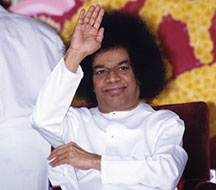
Life teachings of Guru Nanak
00:01:33Guru nanak was the dear son of Tripta Devi and Srikaara. He gave great importance to devotion and dedication. He also stressed on having physical strength and valour to protect one’s devotion, abstaining from desiring things that belong to others. He was a great warrior who propagated that if it is the wealth that one desires then, it is best to desire the wealth of Almighty and none else’s. He taught that valour is quite essential in defending oneself and overcoming the hindrances and obstacles in one’s path of devotion.
-
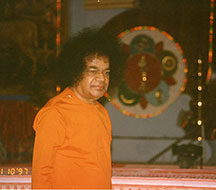
Madhwacharya's dwaitha philosophy
00:02:19Madhvacharya came thereafter and he held the view that if prominence was given only to Bhakthi (devotion) and Jnana (wisdom), man would not be able to realise God. He propounded the philosophy of ‘dwaitha’ dualism. He was the beloved son of Vedavathi and Madhyadeha. He was of the view that if one concentrated on oneself, one would remain a ‘Jiva’ or an individual forever and as a Jiva, one will never be able to understand something that is different from oneself, as God and therefore Madhvacharya preached dualism. The intentions of Madhvacharya were sacred. He said that sugar can never understand the sweetness of sugar and God is like sugar and if one remains as sugar, one cannot understand the sweetness of sugar; hence one must become an ant in order to appreciate and taste the sweetness of sugar.
-
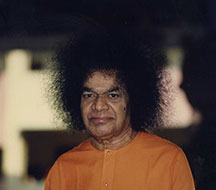
Ramanujacharya's visishtadwaitha philosophy
00:06:16He began preaching and establishing the fact that it is the one atma that pervades all beings, God is one but due to the different forms one sees the diversity; the all pervading divinity is one and only one without a second. With time it was felt that it was difficult for ordinary humans to follow and comprehend the sacred concepts of adwaitha namely oneness of God. Therefore Ramanujacharya took upon himself to advocate an alternative path. Ramanuja was the beloved son of Kanthimati and Surakesa. He preached that bhakthi or devotion is the path to divinity and postulated that the divine God is the worshipped one and the devotees or the seekers are the worshippers. In this was he introduced a special and qualified dualism in understanding of the divinity. The qualified dualism that he preached stated that the destination for all beings is the same. He compared the seeker to a river and God to a ocean. The river flows into the ocean and merges with it losing its identity; likewise following the path of devotion one realises that the worshipped and the worshipper are one and the same and ultimately merge into each other. This was the philosophy propounded by Ramanujacharya. When one studies this principle in depth, one realises that this is alike to the Adwaitha philosophy. When one ponders over the origin of river, one can decipher that the river originates from the rain, and the rain in turn from the clouds and the clouds from the ocean. So in a nut shell, rivers, the worshippers, are formed from the ocean, the worshipped, and are returning back to the ocean. This philosophy was called as ‘Visishtadwaitha’. It is only when the river has the loving desire to reach the ocean, its ultimate destination, then alone can it merge with the ocean. This love is known by the sacred name of ‘bhakthi’ or devotion. Pure, unwavering and unsullied love is called as bhakthi. The kind of love which does not desire anything other than God is bhakthi. The urge which makes one want for oneself is ‘love’, it is not for the want of materialistic and worldly things but for oneself who is essentially the divine. Loving the divine as one loves one’s reflection in the mirror is called as bhakthi. Ramanujacharya gave importance to bhakthi and propagated this philosophy of ‘Visishtadwaitha’.
-
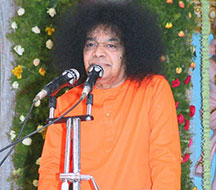
Shankaracharya's adwaitha philosophy
00:02:00Making the philosophy of oneness of humanity as the basis, Shankaracharya undertook the task of preaching unity, spirituality and the concept of adwaitha to the world. He was born in the state of Kerala to Aryamba and Shiva guru. At a tender age he mastered the vedas and shastras and began preaching with an aim to establish the principles of Adwaitha. He considered wisdom as the prerequisite element to realise the vision of adwaitha or oneness. He began preaching and establishing the fact that it is the one atma that pervades all beings, God is one but due to the different forms one sees the diversity; the all pervading divinity is one and only one without a second.
Topics
- Analogies
- Atma
- Attachment
- Balvikas
- Bhaja Govindam
- Bhajans
- Body
- Character
- Company
- Compassion
- Culture
- Day to day
- Desire
- Devotees
- Devotion
- Dharma
- Discipline
- Discrimination
- Doctors
- Education
- Faith
- Festivals
- Forbearance
- Gayathri
- God
- Gratitude
- Guru
- Health and healthcare
- HIS Life
- Human values
- India
- Karma
- Love
- Mahabharata
- Man
- Meditation
- Mind
- Music
- Musicians
- Namasmarana
- Nature
- Parents
- Philosophical concepts
- Pleasure and Pain
- Practice
- Ramayana
- Religion
- Sacrifice
- Sadhana
- Sai Organization
- Sathya
- Science
- Senses
- Service
- Sevadal
- Shanthi
- Shirdi Baba
- Society
- Spirituality
- Students
- Thoughts
- Time
- Unity
- Upanishad
- Vedas
- Vices
- Yoga
- Youth
